The Left-Handed Booksellers of London Read online
Page 2
“This way! Come on!”
He was running now. Susan followed as best she could, fighting the feeling that they would both run into something and really hurt themselves, balanced against the feeling that something even worse would happen if they didn’t outpace the black fog that she was sure still followed, flowing faster in the darkness, tendrils reaching out to either side, looking for her. . . .
Merlin stopped.
“We’re on it,” he said. “We can walk slowly now. Stay close, stay on the path.”
“I can’t even see the path!” gasped Susan.
“Keep right behind me,” said Merlin. He was walking slowly. The sky was lighter above, here, and there was more open space about the path, the trees not crowding so close.
Susan looked behind her, eyes wide as they’d go, trying to see. The dark seemed to be of different tones, different shades.
“That fog,” she whispered. “I think it followed us.”
“Yes,” said Merlin. “But it can’t come onto the path.”
“Why not?”
“It’s an old thing, and obeys old custom,” said Merlin. “Anyway, it’s not so much the fog itself we have to worry about, it’s the Shuck.”
“The Shuck?”
“The fog is what you might call a companion effect,” said Merlin. “It disorients and distracts, and it’s necessary for the thing that moves within the fog, once it’s thick enough. That’s the Shuck. Though it has other names, too.”
He slowed, studying the ground in front. The path was veering off to the right and there was a copse of young beech trees straight ahead. “The new path isn’t following the old straight track. We’ll have to turn around and go back.”
“Go back!”
“Yes. Backwards and forwards till dawn, if necessary.”
“But the . . . the Shuck thing . . .”
“It can’t touch us on the true path, either,” said Merlin. “Turn about. Don’t step off!”
Susan turned on the spot, and started walking slowly back the way they had come, following the path as best she could.
“I can’t see,” she whispered after only a few steps. She could hear the loose gravel of the path under her feet, different from leaf mold and mud. But it was too easy to wander off in the darkness, lose the way.
“If you don’t object, I’ll hold your shoulders and direct you,” said Merlin. “Walk slowly. It’ll be fine.”
She felt his hands come down on her shoulders, a light touch. But even so, his left hand felt odd. She could feel a weird warmth from it, coming through glove and overall bib and her T-shirt, as if he had some sort of warming device in that hand. He pushed slightly on the right, redirecting her.
“On the positive side,” Merlin said after they’d slowly walked thirty or forty yards, “no one else will dare come after us now they’ve loosed the Shuck.”
“They won’t?”
“It’s not very discerning,” said Merlin. “Hopefully, the rain earlier will have ensured no one else is in the wood tonight. Slow down. Damn!”
“What?”
“The path at this end veers away as well and trees have grown up. Why couldn’t they follow the old track? Stop. We’ll turn around again.”
They turned around. For the first time, Susan realized there was something else disturbing her. Besides all the obviously disturbing things like “Uncle” Frank turning into dust, the giant bug, the black fog.
“I can’t hear the traffic. Or the trains. Or anything except us. Why is it so quiet?”
“It is two a.m.”
“Oh, come on. I might be from the country, but I’ve been to London before.”
“Ah. Which part of the country?”
“West Country. Between Bath and Chippenham. Don’t change the subject.”
“I’m afraid the silence means we are now completely surrounded by the fog within which the Shuck roams. Speaking of which, it will probably try to scare us from the path, so be ready. Hold my shoulders and stay close.”
They walked on, the only sounds coming from the gravel and snapping twigs beneath Cuban heels and Doc Marten air soles and Susan’s breathing, which still hadn’t slowed down.
“Moon’s coming out of the cloud,” said Merlin.
“Is that good?” asked Susan.
“Not always. Good for us tonight. A new moon is kinder to the younger folk, meaning humans, for the most part. And it makes it easier to see the path as well.”
It did make it easier to see the path. In fact, the mix of gravel and leaf mold and mud was now luminous, not simply reflecting the soft, pale light of the moon but seemingly kindled by it.
The moonlight also made the black fog more palpable. It was all around them, walling them in, making the path like a narrow, dangerous alley. Every now and then tendrils and wisps edged in, recoiling as they reached the path, rolling back into the mass.
A few paces farther along, Susan’s nose suddenly wrinkled and she felt bile rise in her throat.
“I can smell something really horrible,” she whispered. “Like rotting meat and . . . foul water. . . .”
“It’s the Shuck,” said Merlin. He didn’t lower his light, tuneful voice. “It’s probably been summoned from the stretch of the Fleet that took away the offal and blood from the Smithfield Market, and so hates mortals all the more for defiling its water. Don’t look. It’s pacing us, a little behind and to the right.”
The smell grew stronger, and the hairs on the back of Susan’s neck rose and she felt a shiver between her shoulder blades, as if the point of an impossibly sharp tooth rested there, waiting to be driven into her flesh.
“Let’s play twenty questions,” said Merlin easily. “Take your mind off . . . er . . . things.”
“That yes-no thing always drives me crazy,” said Susan. It took an effort for her to speak normally. She was acutely aware that there was something behind her, something huge and horrible whose breath reeked of carrion. “How about we actually answer each other’s questions.”
“Sure,” said Merlin. “We’re coming up to where we need to turn around again. Keep your eyes down. If you do see the Shuck, don’t look directly at it.”
“Okay,” replied Susan. “Uh, when I say actually answer questions, this isn’t one of those situations where if I know too much you have to kill me, is it?”
“You already know too much,” said Merlin. “But you’re not at risk from me. Or mine. Though I’m afraid your life might never be the same.”
“Oh,” said Susan.
“Some of it might be an improvement,” said Merlin carefully. “Depending on your actual relationship with your ‘uncle’ Frank. Eyes down, turn around.”
Susan tried to keep her eyes down, but even so she did catch a very fleeting glimpse of something terrible within the fog, a massive, misshapen, twisted thing with eyes like open wounds and a vast, constantly dripping maw—
“Eyes down! Keep walking!”
“I am, I am,” Susan said, shuddering.
“It’s dropped back. And it really can’t get us on the path,” said Merlin. “Let’s imagine we’ve met . . . er . . . somewhere . . . and we’re having a chat. So, what were you doing in that house?”
“Frank was one of Mum’s friends from years ago,” said Susan. She opened her eyes again, a little, looking through slitted eyelids. “I thought he was a boyfriend . . . he always sent me presents at Christmas, signed ‘Uncle Frank.’ I never actually met him until I came up to London today. I mean yesterday. I knew straight away that I’d made a mistake. Coming to see him, that is. I was about to sneak out when I heard you come in . . . what did you do to him, anyway? And why?”
“To cut to the heart of the matter, I touched him with a silver object inscribed with Solomon’s spell of unmaking Harmless to mortals . . . humans . . . but Frank was what we call a Sipper. A blood drinker—”
“A vampire!”
“No, they don’t exist, though almost certainly Sippers are the basis for the le
gend. They do bite, but nearly always at wrist or ankle, not the neck—because they don’t want to kill—and they’re very small bites. They let the blood flow and sip it. No big hollow teeth nonsense; they lap it up like a cat. Triangular-pointed tongues. One of the signs that gives them away.”
“And you hunt and kill them?”
Merlin sighed.
“No. We usually leave them alone, provided they behave themselves. In fact, there’s a Sipper who works for us in accounts, and . . . uh . . . our infirmary. Sipper saliva has powerful healing properties.”
“So why stick Frank with your hatpin?”
“You recognized it as a hatpin?”
“I’m an art student. Jewelry is one of my things, though I’m mainly a printmaker. Or I will be an art student, when term starts. That’s why I’m looking for my dad now; I have about three months before I have to buckle down, as Mrs. Lawrence says.”
“Who’s Mrs. Lawrence?”
“My sixth-form school art teacher. She helped me get my place, and says I’m not to waste it.”
“Which art school? Get ready to stop and turn around.”
“The Slade.”
“You must be good, then.”
“My etchings, I believe, are worth coming up to see, as they say. And I can draw. Though it’s not really the rage at the moment. Being able to draw, that is.”
“It must be satisfying to make things. Turn.”
They turned. Susan caught a strong waft of the carrion stench and almost gagged, but she also realized that talking was distracting her. Quickly, she gabbled out the first question that came into her head.
“If we’re safe on the path, can’t we sit down?”
“No,” replied Merlin. “It only has the virtue of the old straight track if we’re moving on it. If we stop, it’s simply a patch of ground, and both the fog and the Shuck will have us.”
“So,” said Susan. “Are you actually a wizard?”
“Well, I’m mainly a bookseller.”
“What?!”
“Really. A bookseller. I handle incoming deliveries for the most part, unpacking, shelving. Not a lot of the actual selling. The right-handed generally do that.”
“The right-handed?”
“It’s a family business, of sorts. Perhaps clan would be a better word. We’re either right-handed or left-handed. Though it can change. ‘One for the books, one for the hooks,’ as we like to say.”
He held up his gloved left hand, stark in the moonlight.
“As you can see, I am of the left-handed moiety.”
“But what does that mean? What’s the hook business?”
“It’s obscure, to be honest. I mean, we’ve never really used hooks. Swords, daggers, hatpins . . . but the left-handed St. Jacques—”
“Sanjucks?”
“San Jark. The family name. French. Though we’re not French and it’s not really our name, it’s something pinned on us by the first Elizabeth; she was confused, and it kind of stuck. Anyway, we left-handed types do most of the active stuff, running about, fighting, and so on. The hook part might be a bitter reflection that, back in the seventeenth century, a number of us ended up strung up on hooks by various religious parties.”
“But what . . . I mean, this Sipper thing . . . and the Shuck and the fog . . . what is going on?”
The last few words burst out of Susan almost like a scream. She’d managed to hold in the bizarre mixture of panic and puzzlement but it was threatening to break free.
“Yeah, I realize it’s a shock. But your best chance of survival is to stay calm and stay with me. Ah, how can I put this? The world you know, the ‘normal’ human world, is the top layer of a palimpsest—that’s a many-times overwritten parchment—”
“I know what a palimpest . . . palimset . . . I know what one is even if I can’t say it.”
“Well, there is another world beneath the everyday human one, and under certain conditions or at particular times, the Old World comes to the top, or elements of it become the primary world, as it were. And there are . . . environments and creatures or individuals who exist on multiple levels at the same time, either due to their nature, or because of some—I guess you’d call it magical—intervention. We booksellers fall in the latter category, both left- and right-handed, and for various reasons we’ve ended up . . . policing, I suppose . . . the interaction between the various more mythic levels, collectively known as the Old World, and the New World—the prosaic human world—what you might fondly call ‘reality.’”
“But what does bookselling have to do with all this?”
“We have to make a living.”
“What!”
“Most of the old mythic levels are sequestered and most Old World entities are bound, or the ones that aren’t behave themselves anyway. We rarely have to intervene. In between, we sell books. There are some other reasons, too; it’s rather complicated. . . . You ready to turn?”
“Uh, yes, I guess.”
They turned about again. This time Susan didn’t bother shutting her eyes, though she kept looking straight down. She could tell from the disgusting drain smell that the Shuck was close, but it bothered her less now. Merlin’s calm, light conversational tone had somehow cut through the fear, as had the rhythmic tramping up and down on the path.
“Uh, I have another question,” said Susan. “Only it’s a bit intrusive. . . .”
“I am human,” said Merlin. “A human male at the moment, as it happens.”
“At the moment?”
“We are somewhat . . . shape-shiftery . . . I guess you could say,” replied Merlin. “I was born male, but I have been pondering if I should change.”
Susan didn’t answer for a moment, digesting this.
“You get to change that easily?”
“Oh, it’s not easy,” replied Merlin. “But much more possible for us than—”
He was interrupted by the sudden sound of a horn, not very far away, from deeper in the woods. Not a car horn, but the deep, long, drawn-out bellow of some large medieval instrument.
“What’s that?”
“The Shuck being called off, sent back to its source,” said Merlin. He had tensed; Susan could feel it through his shoulders. “The fog will dissipate, too. It’s an odd move; there’s still hours before dawn. I wish I knew who summoned it in the first place. It can’t have been Thringley.”
“What do we do?”
“Keep walking, but be ready to run, along the new path. Hear that? The fog’s clearing.”
The sounds of the city were coming back. Traffic; the deep, distant rumble of a train; indistinct voices on the wind. It was lighter, too, particularly back towards Lanchester Road, and intermittent flashes of blue light were coming through the trees.
“The police!”
“At your ‘uncle’ Frank’s house. They’ll have responded to the gunshots, at the least,” said Merlin. He was looking left and right and up into the trees. “I hope not too quickly, for their sake. Okay, the Shuck’s gone. Get ready—”
All of a sudden he pushed Susan violently to the ground. She heard something whoosh above her head as she struggled to get up and then a sudden harsh slap as Merlin’s left hand intercepted something, and he was pushing her back down again with his right. She rolled away and began to sit up, lying back down immediately as a white-fletched, red-shafted arrow whisked past and buried itself deep in the tree behind her.
Merlin batted another arrow away, his left hand moving so fast she could barely see it, his lithe body dancing to avoid another. But he couldn’t move fast enough to avoid the third, which struck him high on the right shoulder with a sound Susan wished she hadn’t heard. He spun around and fell on one knee, his yak-hair bag with the revolver falling from his shoulder. Without any conscious thought, Susan crawled for it, to get the revolver and fire back in the direction the arrows were coming from.
But Merlin hadn’t fallen to one knee. He’d knelt on purpose, hitching up his trouser leg to draw a small
automatic pistol from an ankle holster. This one he fired right-handed, while his left hand continued to deflect arrows up and away, protecting both himself and Susan.
The smaller pistol’s shots were much quieter than the big revolver, which Susan was still trying to extract from the bag. Almost like a sharp dog’s bark, but the flash was bright and Merlin fired fast, eight shots in quick succession. After his fifth shot, there were no more arrows.
Susan got the revolver out, holding it in two hands. She’d fired shotguns, and ironically was a fair archer, but she’d never fired a handgun before. Still, it seemed simple enough.
“No, no . . . put it down,” said Merlin. He put his back against a tree trunk and his left hand gripped the shaft of the arrow. “Police’ll be here . . . any minute . . . from Frank’s . . .”
“Who fired the arrows?”
“A Raud Alfar warden . . . I guess awakened by the Shuck . . . ah . . . intrusion. That’s why Shuck . . . called off . . . should have . . . have thought of the Raud Alfar . . . propitiated them with gifts. . . .”
“Did you kill . . . er . . . this warden?”
“No . . . gunfire drives . . . off. Sometimes. Machine sounds . . .”
Susan left the revolver on the bag for easy access and crawled over to Merlin. In the moonlight she could see the arrow was embedded below his shoulder bone, and his shirt and the mustard-colored coat were already sodden with blood. She hadn’t looked at him up close until now, but she didn’t have time to dwell on how handsome he was, because he was much paler than he should be and his breath was coming in short, controlled gasps.
“I need . . . your . . . help. A silver vial in my left . . . waistcoat pock . . . get . . . good . . . open it . . . swish and hold in your mouth . . . yes, I know . . . and hold . . . I’m going to break arrow, push it through. Soon as I do, spit into . . . wound.”
Whatever was in the vial was disgusting, but Susan swished it from cheek to cheek and held it. Merlin snapped the shaft easily with his left hand, letting out a small gasp, his face twisted in pain. He gasped again as he started pushing the shaft through, and tears welled up in his eyes.
“Pull . . . pull it through . . . and spit. . . .” he whispered, fainting, and fell forward, the bloodied arrowhead thrust clear out of his back.

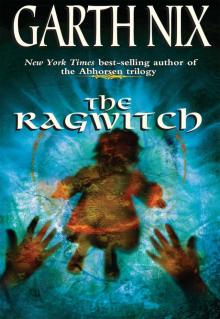 The Ragwitch
The Ragwitch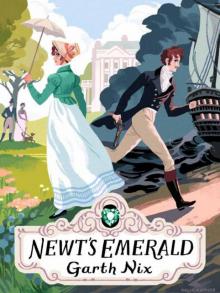 Newt's Emerald
Newt's Emerald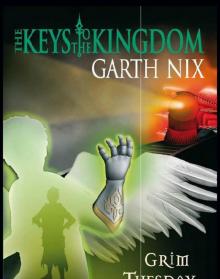 Grim Tuesday
Grim Tuesday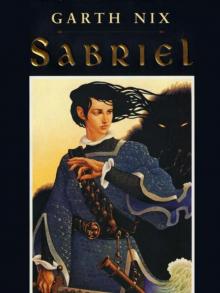 Sabriel
Sabriel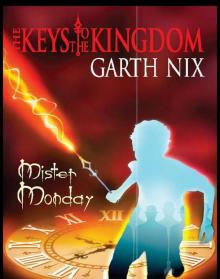 Mister Monday
Mister Monday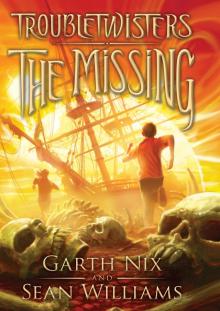 The Missing
The Missing The Fall
The Fall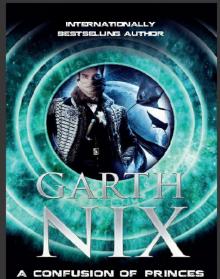 A Confusion of Princes
A Confusion of Princes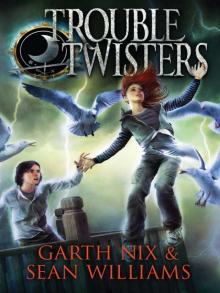 Troubletwisters
Troubletwisters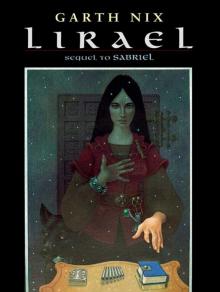 Lirael
Lirael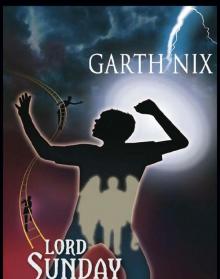 Lord Sunday
Lord Sunday Clariel
Clariel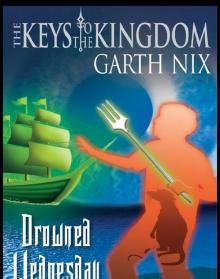 Drowned Wednesday
Drowned Wednesday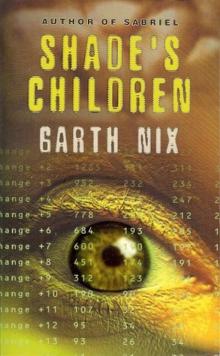 Shade's Children
Shade's Children The Violet Keystone
The Violet Keystone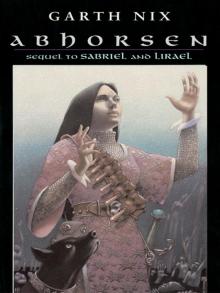 Abhorsen
Abhorsen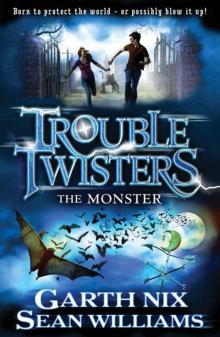 The Monster
The Monster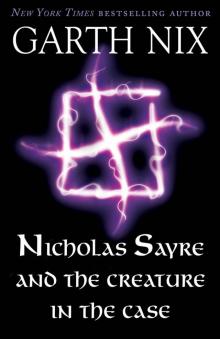 The Creature in the Case
The Creature in the Case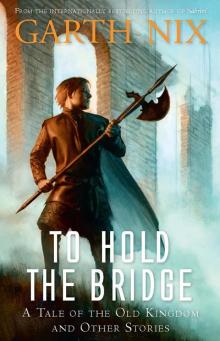 To Hold the Bridge
To Hold the Bridge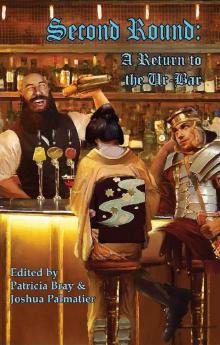 Second Round: A Return to the Ur-Bar
Second Round: A Return to the Ur-Bar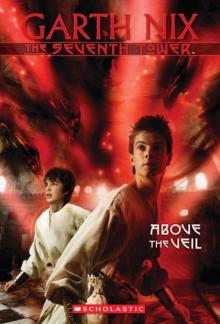 Above the Veil
Above the Veil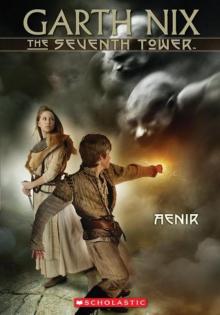 Aenir
Aenir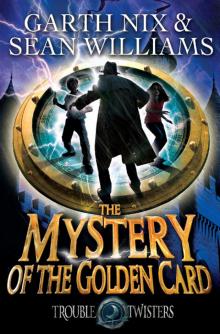 Mystery of the Golden Card
Mystery of the Golden Card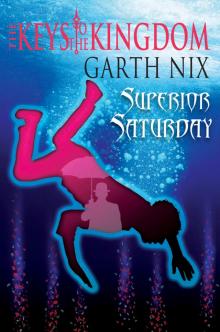 Superior Saturday
Superior Saturday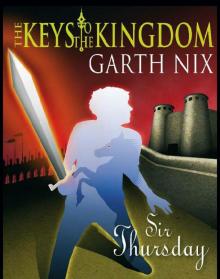 Sir Thursday
Sir Thursday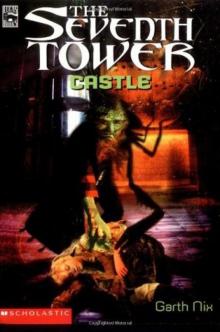 Castle
Castle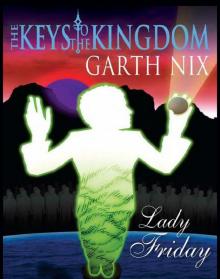 Lady Friday
Lady Friday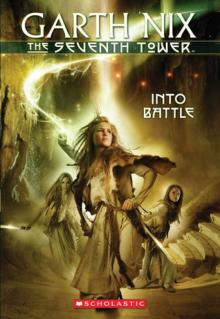 Into Battle
Into Battle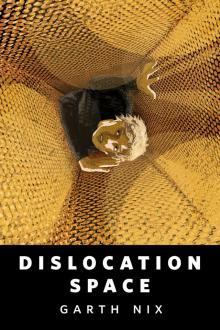 Dislocation Space
Dislocation Space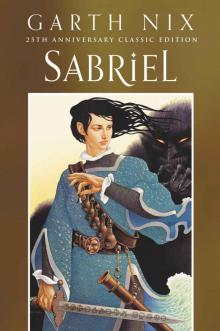 Sabriel (Old Kingdom Book 1)
Sabriel (Old Kingdom Book 1)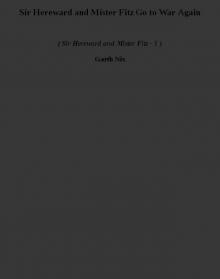 Sir Hereward and Mister Fitz Go to War Again shamf-1
Sir Hereward and Mister Fitz Go to War Again shamf-1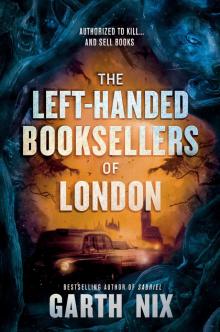 The Left-Handed Booksellers of London
The Left-Handed Booksellers of London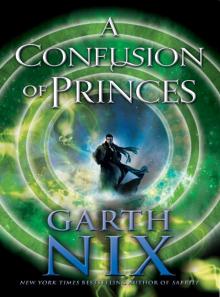 Novel - A Confusion of Princes
Novel - A Confusion of Princes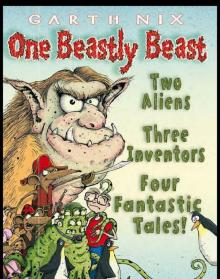 One Beastly Beast
One Beastly Beast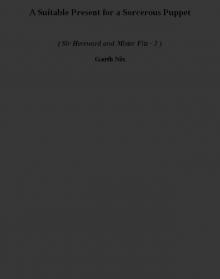 A Suitable Present for a Sorcerous Puppet shamf-3
A Suitable Present for a Sorcerous Puppet shamf-3 Beyond the Sea Gates of the Scholar Pirates of Sarsköe shamf-2
Beyond the Sea Gates of the Scholar Pirates of Sarsköe shamf-2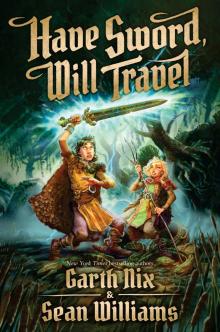 Have Sword, Will Travel
Have Sword, Will Travel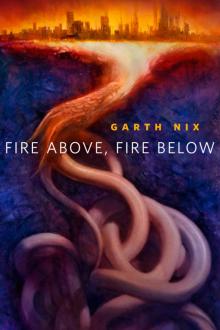 Fire Above, Fire Below
Fire Above, Fire Below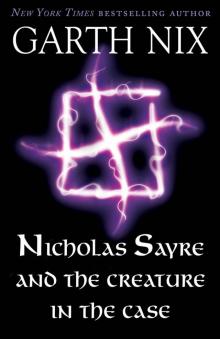 Nicholas Sayre and the Creature in the Case
Nicholas Sayre and the Creature in the Case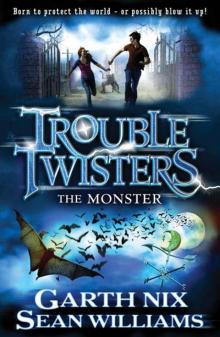 The Monster (Troubletwisters)
The Monster (Troubletwisters)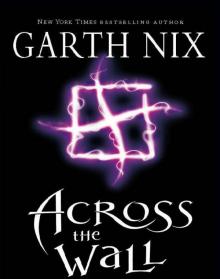 Across the Wall
Across the Wall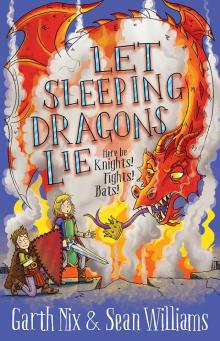 Let Sleeping Dragons Lie
Let Sleeping Dragons Lie![[Abhorsen 03a] - Across the Wall Read online](http://i1.bookreadfree.com/i2/04/12/abhorsen_03a_-_across_the_wall_preview.jpg) [Abhorsen 03a] - Across the Wall
[Abhorsen 03a] - Across the Wall